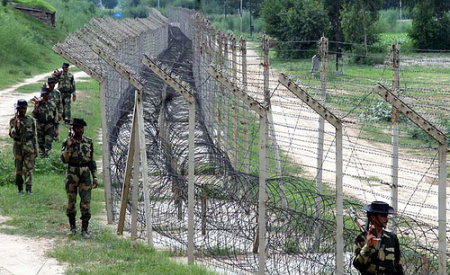India fired at Pakistan 400 times in year 2016
Islamabad, Pakistan: Year 2016 was one of the hottest years at Indo-Pak borders as Indian forces conducted over 400 violations by resorting unprovoked firings at Line of Control (LoC) and Working boundary during the calendar year of 2016.
As many as 360 violations were reported at LoC while 40 times Pak-Indo Working Boundary was under fire from Indian Para-military forces. Figures indicate that almost every day and night Pakistani borders were under attack from Indian forces.
The main target of Indian forces had been civilian population of Azad Kashmir where Indian forces had not only been targeting civilian locations rather civilian transportations were under attack, killing several people who were commuting in civilian buses. As many as 38 civilians of Azad Kashmir were Shaheed (Martyred) and 130 were seriously injured.
According to data gathered from different sources, over 40 Indian soldiers were killed when Pakistani forces responded unprovoked Indian attacks over Pakistani check posts.
Though year 2016 started with a cordial diplomatic gesture from India, the whole year had been tensed and unfriendly regarding Indo-Pak relations.
Indian Prime Minister Narendra Modi arrived in Lahore on December 25, 2015 for a meeting with Prime Minister Nawaz Sharif in a surprise visit and landed at Lahore Airport. Modi was received by Nawaz Sharif who took him to his residence in Jati Umrah. Modi was travelling back to Delhi from Kabul and sent a message to his counterpart while flying over Pakistan that he wanted to wish Nawaz his birthday.
This historic development was considered as an ice breaker for cold Indo-Pak relations by diplomatic circles. However, things started changing in the first week of January 2016 and Indian establishment allegedly staged Pathankot attack on 2 January 2016 — just after eight days of Modi-Nawaz meeting. Indian establishment blamed Pakistani establishment for attacking Pathankot Air Force Station.
The responsibility of Pathankot attack was claimed by United Jihad Council— an Indian Occupied Kashmir-based militant group but Indian establishment used indigenous event against Pakistan to malign Pakistani establishment.
The whole year had been volatile regarding Indo-Pak relations and Pakistan arrested serving officer of Indian Army Kulbhushan Yadav from Balochistan where he was travelling and working with fake passport of “Hussain Mubarak Patel”. He confessed in his video statement that he was working for Research and Analysis Wing (RAW) intelligence agency of India since long to destabilise Pakistan and for executing terrorist attacks all over Pakistan, particularly Karachi and Balochistan.
India refused to hold serious diplomatic meetings with Pakistan despite constant demands of Pakistan to hold secretary-to-secretary level talks at diplomatic horizon.
India-Pak relations became tenser when Indian establishment allegedly staged another incident—- this time it was Uri– an Indian Army brigade headquarters near LoC.
Indians claimed that four heavily armed terrorists entered Uri Brigade Headquarter on 18 September 2016 near the town of Uri in the Indian-Occupied Kashmir. Indian media claimed that it was “the deadliest attack on security forces” in Kashmir in last two decades. However, India failed to link this attack with Pakistani establishment at international diplomatic horizon and countries like Russia categorically rejected claim of India of possible involvement of Pakistan in Uri and Pathankot attacks.

On 29 September 2016, Indian Army claimed that it had executed “surgical strikes” against militant launch pads across the Line of Control in Azad Kashmir and inflicted “significant casualties”. However, India could not manage to proof its claims in Indian media as well as in Indian parliament because of a weak script India wrote for “surgical strike drama.
Defence experts believe that hostile conduct of Indian forces and constant release of intimidating statements of Indian politicians against Pakistan were designed to engage Pakistani into a full-fledged war but Pakistani civil and military leadership successfully avoided this trap.
“It could be difficult for Pakistani civil as well as military leadership to avoid such naked intimidation but Pakistan successfully manage to get out of this trap of India”, commented Russian media after Uri attack.
